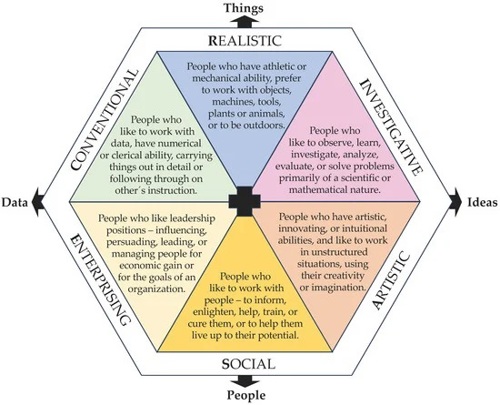When you consider career options, you will naturally dismiss some based on your personal likes and dislikes, as well as what you know about your strengths.
For example, working as a pilot won’t appeal to you if you’re afraid of flying. Becoming an actor or a lawyer isn’t an option if you prefer not to take centre stage. Based on who you are, some careers aren’t going to be right for you. You just know that.
But how do you know what career might be the best fit and bring you the greatest satisfaction? According to John Holland’s theory of career choice (also known as the Holland codes), the trick to successful career planning is to start by understanding your strengths in a more organized way.
6 personality traits that predict career fit
Holland’s theory sees self-knowledge—understanding your personality traits, interests, and strengths—as the key to career choice and development. A rewarding career will involve work that you enjoy doing in an environment where you feel you fit in.
The man who came up with this theory, a psychologist named John Holland, identified 6 human traits, or personality types, which can help people identify suitable career paths.
Realistic (R)
Realistic people are practical, hands-on doers who enjoy working with things, like tools, machinery, plants, or animals. They often prefer jobs that involve physical activities or working outdoors.
Investigative (I)
Investigative people are curious, critical thinkers. They like to solve problems, gather information, and use their brains. They often do well in scientific, technical, or research-oriented careers.
Artistic (A)
Artistic people have good imaginations and are creative. They are emotional and enjoy expressing themselves through art, music, writing, dance, or other forms of self-expression. They often find fulfilment in jobs that allow them to be creative.
Social (S)
Social individuals are people oriented and co-operative. They enjoy helping and working with others. They often excel in careers that involve counselling, teaching, health care, or any role that involves connecting with people.
Enterprising (E)
Enterprising people are ambitious and enjoy taking charge. They like to persuade and lead others, and they often do very well in sales, business, management, or entrepreneurial roles.
Conventional (C)
Conventional people are organized and detail oriented. They like to follow established rules and procedures. They often do well in jobs that require paying close attention and working with data, such as accounting or administrative roles.
Find your Holland code
Most people will identify with 2 or 3 dominant character traits. Your strongest traits, or those that describe you the best, can help point you toward a career that matches your personality and interests.
Your Holland code will be the first letters of your 2 or 3 most dominant traits (RIASEC) in order of strongest first. Try these approaches to get your Holland code:
- Go with your instinct. You probably know yourself pretty well, so picking your top character traits from the list of 6 above might be easy for you. Give it a try: put the 6 traits in order, from most like you to least like you. If you can’t decide between a couple, that’s OK. Just write down your top 2 or 3 choices.
- Check with someone who knows you. Once you’ve decided which of the 6 categories best describe your personality, ask someone who knows you well which categories they would put you in. If your answers match, you’re on the right track. If they don’t, ask them why they answered as they did—they may have insights that didn’t occur to you.
- Test it out. Take the Holland Codes Quiz. Based on your answers, it will put the 6 human traits in order for you. The key to getting accurate results is to keep it real. Make sure your answers reflect who you really are and not who you wish you could be!
Remember, your code is just a tool. It is not meant to label or restrict you. Self-awareness can lead to informed decision making. The goal of this exercise is to steer you toward a satisfying career.
Interpret your code
People tend to enjoy doing things they are good at. Your Holland code can help you identify a work environment that fits you—and ones that might not be ideal.
In the framework below, the realistic personality type appears next to things. Data and ideas are nearby, but people is on the opposite end of the hexagon. This matches the definition of realistic provided earlier:
- Realistic (R): Realistic people are practical, hands-on doers who enjoy working with things, like tools, machinery, plants, or animals. They often prefer jobs that involve physical activities or working outdoors.
So, people who have R as their strongest personality trait will likely feel most satisfied in a career where their work is focused on things rather than people.

Look at the framework again. The personality traits that are next to each other on the outside of the hexagon have more in common with one another than those that are further away. Realistic personalities are more like conventional or investigative personalities and less like artistic, social, and enterprising ones.
In theory, people with similar personality types and interests will naturally pursue similar careers.
Discover occupations that match your code
Once you know your Holland code, you can use the information to help decide whether an occupation that you think might be a good fit for you really is.
Based on the specific qualities of the 6 personality types, here are just a few examples of occupations that could be considered a good fit for each:
- Realistic (R): Architect, dairy producer, ironworker, mechanic, park warden, truck driver
- Investigative (I): Biologist, computer programmer, dentist, policy analyst
- Artistic (A): Graphic designer, interior designer, musician, writer
- Social (S): Event coordinator, police officer, social media specialist, social worker
- Enterprising (E): Account executive, producer, real estate agent
- Conventional (C): Accountant, administrative officer, economist, financial advisor
As you think about your career options, try comparing your Holland code against the requirements for each occupation.
And don’t worry. Even if it turns out that your personality is not an ideal match with your dream career, you can use your code to identify areas for personal growth and improve your chances of future success.
You’ve got this! Enjoy your journey of self-discovery as you explore potential careers.
Check out other career development theories
Choosing a career is a big decision. Exploring different ways to approach it can make the process a little easier. Here are some other career development theories to consider:




